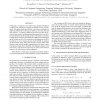Free Online Productivity Tools
i2Speak
i2Symbol
i2OCR
iTex2Img
iWeb2Print
iWeb2Shot
i2Type
iPdf2Split
iPdf2Merge
i2Bopomofo
i2Arabic
i2Style
i2Image
i2PDF
iLatex2Rtf
Sci2ools
125
click to vote
ICASSP
2011
IEEE
2011
IEEE
Maximum likelihood adaptation of histogram equalization with constraint for robust speech recognition
In this paper, we propose a novel feature space adaptation technique to improve the robustness of speech recognition in noisy environments. Histogram equalization (HEQ) is an effective technique for improving robustness by reducing the difference between clean and noisy features. A weakness of HEQ is that it does not take into account acoustic model, resulting in possible mismatch between HEQprocessed features and the acoustic model. In this paper, we propose to adapt HEQ to maximize the likelihood of HEQ-processed features on the acoustic model, with a constraint on the parameters of HEQ. In addition, we use a Gaussian mixture model (GMM) to represent the clean feature space rather than using the acoustic model itself, and this results in both simpler implementation and better results. Experimental results show that HEQ with adaptation reduces word error rate by 7.5% and 5.7% respectively on Aurora-2 and Aurora-4 tasks over the HEQ baseline without adaptation.
Related Content
| Added | 20 Aug 2011 |
| Updated | 20 Aug 2011 |
| Type | Journal |
| Year | 2011 |
| Where | ICASSP |
| Authors | Xiong Xiao, Jinyu Li, Engsiong Chng, Haizhou Li |
Comments (0)

